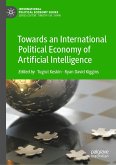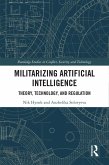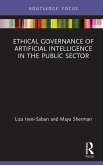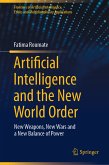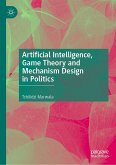Valerie M Hudson
Artificial Intelligence And International Politics (eBook, PDF)
43,95 €
43,95 €
inkl. MwSt.
Sofort per Download lieferbar

22 °P sammeln
43,95 €
Als Download kaufen

43,95 €
inkl. MwSt.
Sofort per Download lieferbar

22 °P sammeln
Jetzt verschenken
Alle Infos zum eBook verschenken
43,95 €
inkl. MwSt.
Sofort per Download lieferbar
Alle Infos zum eBook verschenken

22 °P sammeln
Valerie M Hudson
Artificial Intelligence And International Politics (eBook, PDF)
- Format: PDF
- Merkliste
- Auf die Merkliste
- Bewerten Bewerten
- Teilen
- Produkt teilen
- Produkterinnerung
- Produkterinnerung

Bitte loggen Sie sich zunächst in Ihr Kundenkonto ein oder registrieren Sie sich bei
bücher.de, um das eBook-Abo tolino select nutzen zu können.
Hier können Sie sich einloggen
Hier können Sie sich einloggen
Sie sind bereits eingeloggt. Klicken Sie auf 2. tolino select Abo, um fortzufahren.

Bitte loggen Sie sich zunächst in Ihr Kundenkonto ein oder registrieren Sie sich bei bücher.de, um das eBook-Abo tolino select nutzen zu können.
This book focuses on the early stirrings of interest in artificial intelligence as a potentially useful method of political analysis. It examines three general areas of artificial intelligence: international interaction, decision making groups, and cognitive processes in international politics.
- Geräte: PC
- mit Kopierschutz
- eBook Hilfe
Andere Kunden interessierten sich auch für
![Towards an International Political Economy of Artificial Intelligence (eBook, PDF) Towards an International Political Economy of Artificial Intelligence (eBook, PDF)]() Towards an International Political Economy of Artificial Intelligence (eBook, PDF)113,95 €
Towards an International Political Economy of Artificial Intelligence (eBook, PDF)113,95 €![Militarizing Artificial Intelligence (eBook, PDF) Militarizing Artificial Intelligence (eBook, PDF)]() Nik HynekMilitarizing Artificial Intelligence (eBook, PDF)44,95 €
Nik HynekMilitarizing Artificial Intelligence (eBook, PDF)44,95 €![Ethical Governance of Artificial Intelligence in the Public Sector (eBook, PDF) Ethical Governance of Artificial Intelligence in the Public Sector (eBook, PDF)]() Liza Ireni-SabanEthical Governance of Artificial Intelligence in the Public Sector (eBook, PDF)21,95 €
Liza Ireni-SabanEthical Governance of Artificial Intelligence in the Public Sector (eBook, PDF)21,95 €![Artificial Intelligence and International Relations Theories (eBook, PDF) Artificial Intelligence and International Relations Theories (eBook, PDF)]() Bhaso NdzendzeArtificial Intelligence and International Relations Theories (eBook, PDF)97,95 €
Bhaso NdzendzeArtificial Intelligence and International Relations Theories (eBook, PDF)97,95 €![Artificial Intelligence and the New World Order (eBook, PDF) Artificial Intelligence and the New World Order (eBook, PDF)]() Fatima RoumateArtificial Intelligence and the New World Order (eBook, PDF)81,95 €
Fatima RoumateArtificial Intelligence and the New World Order (eBook, PDF)81,95 €![Artificial Intelligence and Evaluation (eBook, PDF) Artificial Intelligence and Evaluation (eBook, PDF)]() Artificial Intelligence and Evaluation (eBook, PDF)42,95 €
Artificial Intelligence and Evaluation (eBook, PDF)42,95 €![Artificial Intelligence, Game Theory and Mechanism Design in Politics (eBook, PDF) Artificial Intelligence, Game Theory and Mechanism Design in Politics (eBook, PDF)]() Tshilidzi MarwalaArtificial Intelligence, Game Theory and Mechanism Design in Politics (eBook, PDF)81,95 €
Tshilidzi MarwalaArtificial Intelligence, Game Theory and Mechanism Design in Politics (eBook, PDF)81,95 €-
-
-
This book focuses on the early stirrings of interest in artificial intelligence as a potentially useful method of political analysis. It examines three general areas of artificial intelligence: international interaction, decision making groups, and cognitive processes in international politics.
Dieser Download kann aus rechtlichen Gründen nur mit Rechnungsadresse in A, B, BG, CY, CZ, D, DK, EW, E, FIN, F, GR, HR, H, IRL, I, LT, L, LR, M, NL, PL, P, R, S, SLO, SK ausgeliefert werden.
Produktdetails
- Produktdetails
- Verlag: Taylor & Francis eBooks
- Seitenzahl: 422
- Erscheinungstermin: 30. August 2019
- Englisch
- ISBN-13: 9780429698897
- Artikelnr.: 57606538
- Verlag: Taylor & Francis eBooks
- Seitenzahl: 422
- Erscheinungstermin: 30. August 2019
- Englisch
- ISBN-13: 9780429698897
- Artikelnr.: 57606538
- Herstellerkennzeichnung Die Herstellerinformationen sind derzeit nicht verfügbar.
Valerie M Hudson
Introduction 1. Artificial Intelligence and International Relations: An Overview Part One: Conceptual Issues and Practical Concerns 2. Artificial Intelligence and Intuitive Foreign Policy Decision-Makers Viewed as Limited Information Processors: Some Conceptual Issues and Practical Concerns for the Future 3. Steps Toward Artificial Intelligence: Rule-Based, Case-Based, and Explanation-Based Models of Politics 4. Text Modeling for International Politics: A Tourist's Guide to RELATUS 5. Reasoning and Intelligibility 6. The Computational Modeling of Strategic Time Part Two: AI/IR Research: International Events and Foreign Policy Decision Making 7. Pattern Recognition of International Event Sequences: A Machine Learning Approach 8. Scripting International Power Dramas: A Model of Situational Predisposition 9. UNCLESAM: The Application of a Rule-Based Model of U.S. Foreign Policy Making 10. Modeling Foreign Policy Decision Making as Knowledge-Based Reasoning 11. Decision Making and Development: A "Glass Box" Approach to Representation Part Three: AI/IR Research: The Discourse of Foreign Policy 12. The Expertise of the Senate Foreign Relations Committee 13. Reproduction of Perception and Decision in the Early Cold War 14. Theoretical Categories and Data Construction in Computational Models of Foreign Policy 15. Semantic Content Analysis: A New Methodology for the RELATUS Natural Language Environment 16. Time Space: Representing Historical Time for Efficient Event Retrieval
Introduction 1. Artificial Intelligence and International Relations: An Overview Part One: Conceptual Issues and Practical Concerns 2. Artificial Intelligence and Intuitive Foreign Policy Decision-Makers Viewed as Limited Information Processors: Some Conceptual Issues and Practical Concerns for the Future 3. Steps Toward Artificial Intelligence: Rule-Based, Case-Based, and Explanation-Based Models of Politics 4. Text Modeling for International Politics: A Tourist's Guide to RELATUS 5. Reasoning and Intelligibility 6. The Computational Modeling of Strategic Time Part Two: AI/IR Research: International Events and Foreign Policy Decision Making 7. Pattern Recognition of International Event Sequences: A Machine Learning Approach 8. Scripting International Power Dramas: A Model of Situational Predisposition 9. UNCLESAM: The Application of a Rule-Based Model of U.S. Foreign Policy Making 10. Modeling Foreign Policy Decision Making as Knowledge-Based Reasoning 11. Decision Making and Development: A "Glass Box" Approach to Representation Part Three: AI/IR Research: The Discourse of Foreign Policy 12. The Expertise of the Senate Foreign Relations Committee 13. Reproduction of Perception and Decision in the Early Cold War 14. Theoretical Categories and Data Construction in Computational Models of Foreign Policy 15. Semantic Content Analysis: A New Methodology for the RELATUS Natural Language Environment 16. Time Space: Representing Historical Time for Efficient Event Retrieval

